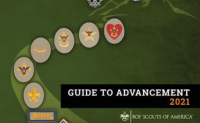 We all know the Cub Scout motto: Do Your Best. But what does it really mean?
We all know the Cub Scout motto: Do Your Best. But what does it really mean?
It means to put out your best effort, no matter what, and make that effort your own effort. We realize that one boy’s best may be different from another boy’s best and we work to make sure each boy can realize his potential.
But somewhere along the way, this changes from doing one’s best to doing what’s required. This has been said to be a key trait of successful leaders – “your best” is sometimes not good enough.
Indeed, in Boy Scout advancement, a boy must meet a set of criteria in order to satisfy a requirement. Take, for instance, learning to tie the timber hitch and clove hitch. If a boy can’t quite get it, and ties an “almost” timber hitch, but says it’s his best, do we accept it? No, of course not – the requirements are not flexible in that regard. Same thing for swimming – lacking other physical complications, a boy must be able to pass the swimming test for First Class. No exceptions.
What happened to “do your best” here?
Doing one’s best is a powerful motivator toward continuous improvement, but only if we’re being honest with ourselves. We cannot hide behind it, telling ourselves that it’s our best effort when we know deep down inside that it isn’t.
Dan Rockwell, a leadership coach who blogs as the Leadership Freak, Â explains it further in a recent blog post, “The Mediocrity of Doing Your Best.” Rockwell tells us that “do your best” is code for “Don’t worry if you don’t make it,” and urges us to set difficult, sometimes uncomfortable, but attainable, goals for ourselves and for others. He lists ten ways to make goals work, including feedback on our progress, which we do through regular Scoutmaster conferences and boards of review, and by developing ways to allow people to evaluate their own success. He also brings up the possibility that some people respond better when goals are set for them, which is exactly what the Boy Scout advancement and merit badge system does.
One of the best things about Scouting is that we, at the unit level, don’t set the actual goals. They are set for us by the program. This avoids many of the pitfalls that Rockwell brings up about group goal setting. It also underscores the BSA policy that the requirements must be met as written – no more, no less.
By meeting set goals and expectations, our Scouts are learning to work in the real world, where such things are commonplace. There isn’t a lot of coddling in the work world. A salesperson isn’t likely to curry favor with the sales manager if the goal was $50,000 and his or her “best” was only $40,000.
Doing your best is fine, as long as it comes honestly. As Rockwell says, don’t “just” do your best!
This post first appeared on Bobwhite Blather.



